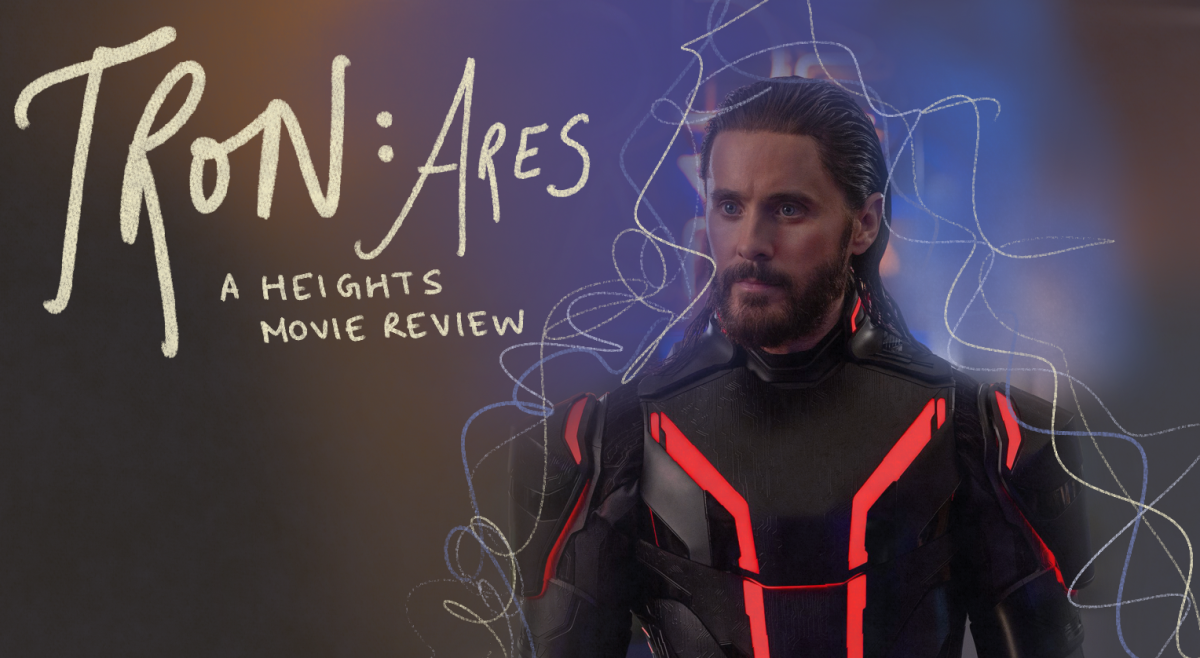Director Kim Nguyen’s The Hummingbird Project is a perfect example of what happens when a film with a for-the-most-part wonderful cast gets overshadowed by a weak script and poor production choices. The premise of this movie is really exciting and fun, but the execution is lacking, and the final product suffers as a result.
The Hummingbird Project follows Vincent and Anton Zaleski—a family duo of powerhouse players in the stock market, portrayed by Jesse Eisenberg and Alexander Skarsgård, respectively—as they try to fulfill their dream of building the most efficient fiber-optic cable line in the world and making millions in trading. While they keep the project working, a combination of internal issues and outside forces converge upon them to try to disrupt their masterful plan.
Easily the best parts of this film are the performances from the two main cast members, as both Eisenberg and Skarsgård are brilliant in their individual roles. Their two characters are polar opposites, but their chemistry is tangible from the moment they first appear on screen. Eisenberg essentially acts the same way as he did when he played Mark Zuckerberg in The Social Network, as he is a fast-talking, charismatic leader who commands every scene of which he’s a part. Skarsgård is a paranoid, introverted genius upon whom the whole operation relies on because of his cable line expertise. The dynamic between the two characters, who are best friends as well as colleagues, makes an average script with confusing pacing much more enthralling and engaging to the viewer than it probably deserved to be.
Salma Hayek, who plays Anton’s ex-boss, however, was not as engaging as her co-stars on screen. Although this issue could be partly due to the script, she just doesn’t fit her role and she overacts in almost every scene where she shows up. Her character feels artificial, and she only ever appears whenever the story needs her present. She is essentially a living, breathing plot convenience, and without her there isn’t much outside conflict in the movie at all. In order for her character to have been effective, she needed to have more screen time, because, with the scarce amount she gets, she might as well just not be in the movie at all.
Where the film really loses its footing is in the script, as both the sequence of events and the details of the operation are jumbled and confusing, especially for viewers who aren’t well-versed in the subject matter. The most glaring example of this is Anton, who is tasked with reducing the speed at which the cable can transfer information by at least one millisecond. The movie does a fine job of explaining why that millisecond is important, but completely forgets to show how he reduces it at all. Now, this wouldn’t be a problem if the film didn’t spend a lot of time with the character through his process, but it does the opposite. It’s hard for the audience to get engrossed in Skarsgård’s admittedly well-acted scenes when nobody has a clue what he’s actually doing on the computer.
Another huge issue with the script comes in the form of the aforementioned conflict. One of the issues in the movie can’t be explained without spoiling the production, but both it and the other source of conflict are forced and aggravating to watch. The less spoiler-filled of the two comes in the form of the FBI hunting down Anton for no reason other than because his ex-boss spitefully told them to. The movie makes it clear that the FBI has no understanding of the situation whatsoever, which only forces the viewer to question why they’re arresting a man on the word of a direct competitor in the same area of business. The fact that the FBI is gullible enough to fall for this obvious business tactic ruins the immersion of the film and is downright infuriating to watch.
Now, despite some of these issues, there are some minor things The Hummingbird Project does well. The score is impressive, and the main theme that recurs throughout the film is tense and really adds to the scenes within which it is played. The cinematography is, for the most part, purposeful, although there are some out-of-place slow-motion shots that start popping up in the third act for some reason. The editing is fine, albeit nothing special, and the pacing of the movie is consistent despite how quickly it seems to want to get through the story.
The Hummingbird Project is a fine movie. It does some things well, and it fails in other areas. If you like movies where Jesse Eisenberg talks fast and sounds smart, this is a must-see. For anyone else, this movie is just fine.
Featured Image by The Orchard



















